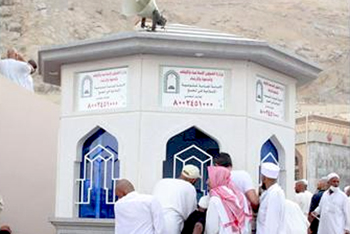Riyadh, Feb 3: Saudi Arabia has asked several countries to shut down their Haj missions in the holy cities of Makkah and Madinah in the off-season, in a renewed bid to curb the mushrooming of illegal offices in these cities.

The Haj missions would be allowed to operate during the Haj season for four months from Shawwal to Muharram every year.
“A circular has been received by the Pakistani mission in this regard,” said Khayyam Akbar, deputy chief of mission at the Pakistani Embassy, Monday. Akbar said the Ministry of Haj had instructed the embassy to open its offices only during the four months stipulated.
An official source said that “several offices, neither allowed by the Saudi government nor associated with foreign diplomatic missions, have sprung up illegally in the three cities, making money through unscrupulous agents.” The move is to close down these operators, he added.
Asked about the status of Indian Haj missions in the two holy cities, B.S. Mubarak, consul general at the Indian Consulate, said that “a circular from the Saudi side has been received.” He said India would comply with the decision.
“We have already removed the signboards from our Makkah mission, while our Haj office in Madinah has fallen under the Madinah demolition zone.” Mubarak said that India would limit the operation of its Haj missions to four months as per the provisions.
Indonesia, which operates its Haj mission in Jeddah, has two offices in Makkah and Madinah, said Ahmed Dumyati, Indonesian Haj consul.
Dumyati said “the Indonesian Haj mission in Jeddah is part of its Jeddah Consulate.”
“We have posted a caretaker to look after our office in Makkah, which is currently closed; while our building in Madinah is also not occupied,” said the Indonesian official.
Several other diplomats contacted by Arab News said they also received the circular. Pakistan, India and Indonesia are among the five countries that send the most pilgrims and workers to Saudi Arabia.
These countries together with several other Muslim states maintain and operate dozens of Haj offices in Makkah, Madinah and Jeddah. Most of these offices also offer residential facilities for diplomats and foreign guests, who fly to the Kingdom throughout year, especially during the Haj season.
Saudi diplomatic missions abroad issue about 8 to 9 million Haj and Umrah visas every year.
Umrah visas represent 55 percent of the total visas issued by the 112 Saudi diplomatic missions and 12 temporary Saudi Haj missions abroad. The ministry of Haj currently deals with about 5,000 private companies including diplomatic missions for Haj and Umrah.





Comments
Add new comment